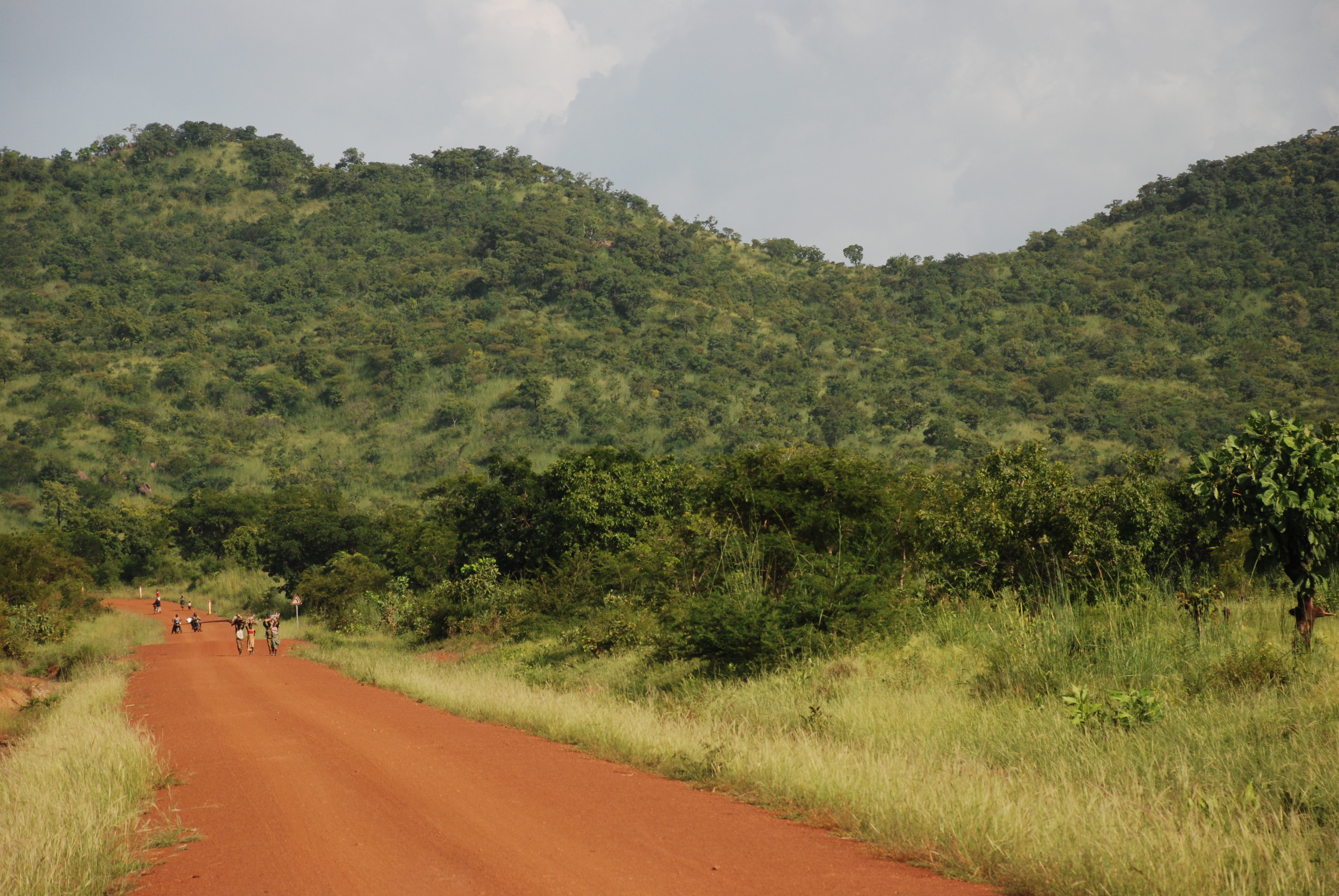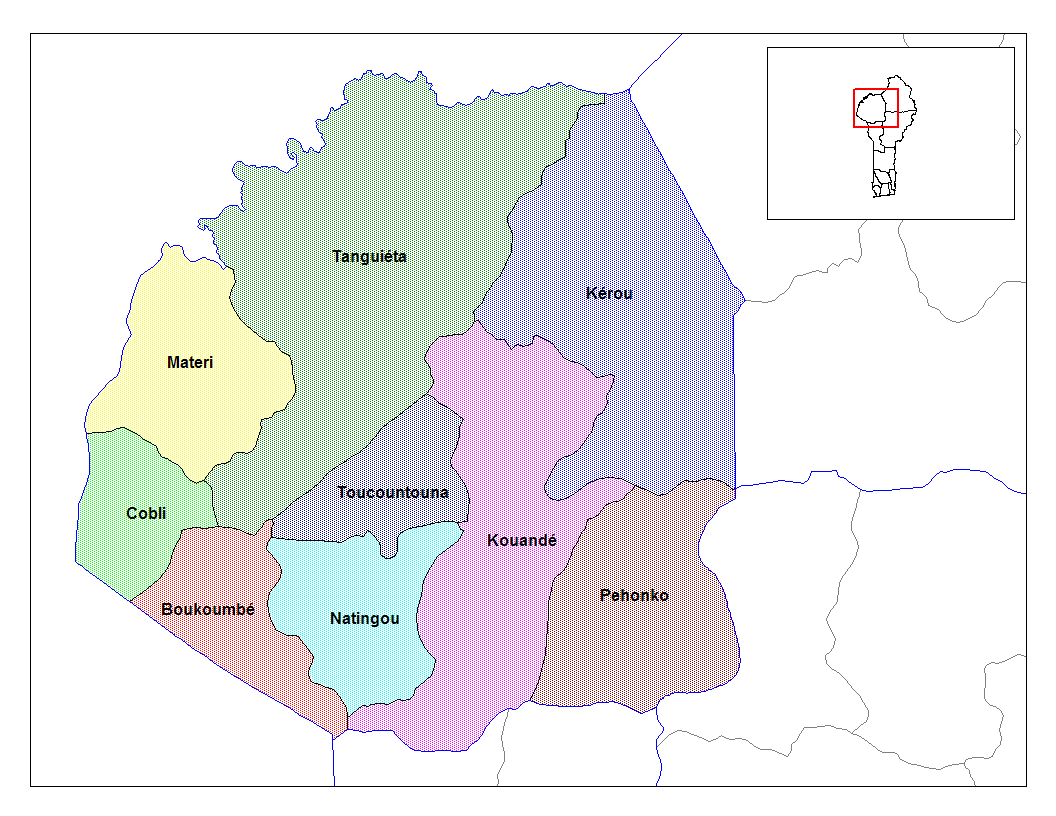Atakora Department on:
[Wikipedia]
[Google]
[Amazon]
Atakora (also spelled Atacora, named for the Atakora Mountains) is the northwesternmost department of
 Atakora Department is located in the northwest of Benin, bordering
Atakora Department is located in the northwest of Benin, bordering
 The department of Atakora was bifurcated in 1999, when its southern territory was transferred to the newly created
The department of Atakora was bifurcated in 1999, when its southern territory was transferred to the newly created
Benin
Benin, officially the Republic of Benin, is a country in West Africa. It was formerly known as Dahomey. It is bordered by Togo to the west, Nigeria to the east, Burkina Faso to the north-west, and Niger to the north-east. The majority of its po ...
. Externally it borders Togo
Togo, officially the Togolese Republic, is a country in West Africa. It is bordered by Ghana to Ghana–Togo border, the west, Benin to Benin–Togo border, the east and Burkina Faso to Burkina Faso–Togo border, the north. It is one of the le ...
to the west and Burkina Faso
Burkina Faso is a landlocked country in West Africa, bordered by Mali to the northwest, Niger to the northeast, Benin to the southeast, Togo and Ghana to the south, and Ivory Coast to the southwest. It covers an area of 274,223 km2 (105,87 ...
to the north; internally it borders the departments of Alibori, Borgou and Donga. Major towns in the Atakora include Natitingou and Tanguiéta, and the major tourist areas include the Tata Somba houses, Pendjari National Park, and various waterfalls. The department of Atakora was bifurcated in 1999, with its southern territory removed to form the newly created Donga Department
Donga is one of the twelve departments of Benin; its capital is Djougou, the fourth largest city in the country. The department of Donga was created in 1999 when it was split off from Atakora Department. Donga is subdivided into five communes ...
. The capital of Atakora Department is Natitingou, which lies among the Atakora Mountains.
, the total population of the department was 772,262, with 380,448 males and 391,814 females. The proportion of women was 50.70%. The total rural population was 62.80%, while the urban population was 37.20%. The total labour force in the department was 170,333, of which 27.20% were women. The proportion of households with no level of education was 72.80%.
Geography
Burkina Faso
Burkina Faso is a landlocked country in West Africa, bordered by Mali to the northwest, Niger to the northeast, Benin to the southeast, Togo and Ghana to the south, and Ivory Coast to the southwest. It covers an area of 274,223 km2 (105,87 ...
to the north, Alibori Department and Borgou Department
Borgou is one of the twelve departments of Benin. Borgou borders the country of Nigeria and the departments of Alibori Department, Alibori, Atakora Department, Atakora, Collines Department, Collines and Donga Department, Donga. The capital of B ...
to the east, Donga Department
Donga is one of the twelve departments of Benin; its capital is Djougou, the fourth largest city in the country. The department of Donga was created in 1999 when it was split off from Atakora Department. Donga is subdivided into five communes ...
to the south and Togo
Togo, officially the Togolese Republic, is a country in West Africa. It is bordered by Ghana to Ghana–Togo border, the west, Benin to Benin–Togo border, the east and Burkina Faso to Burkina Faso–Togo border, the north. It is one of the le ...
to the west. The terrain is mainly forested mountains, from which two tributaries of the Niger River
The Niger River ( ; ) is the main river of West Africa, extending about . Its drainage basin is in area. Its source is in the Guinea Highlands in south-eastern Guinea near the Sierra Leone border. It runs in a crescent shape through Mali, Nige ...
- the Mékrou River and the Pendjari River - originate. Part of the Atakora Mountain Range is located in the region and continues into northeastern Togo. The mountain range is characterised by numerous dambo areas (shallow wetlands) and head swamps. The bulk of the Pendjari National Park lies within Atakora.
The northern regions of Benin receive one season of rainfall from May to September, compared to the southern regions which receive two spells of rain from March to July and September to November. Harmattan
The Harmattan is a season in West Africa that occurs between the end of November and the middle of March. It is characterized by the dry and dusty northeasterly trade wind, of the same name, which blows from the Sahara over West Africa into th ...
winds blow from the northeast during the months of December to March. The country receives an average annual rainfall of around .
Settlements
Natitingou is the departmental capital; other major settlements include Boukoumbé, Birni, Firou, Kouandé, Péhunco, Porga, Tanguiéta and Toucountouna.Demographics
According to Benin's 2013 census, the total population of the department was 772,262, with 380,448 males and 391,814 females. The proportion of women was 50.70%. The total rural population was 62.80%, while the urban population was 37.20%. The proportion of women of childbearing age (15 to 49 years old) was 21.80%. The foreign population was 10,395, representing 1.30% of the total population in the department. The labour force participation rate among foreigners aged 15–64 years was 32.20%. The proportion of women among the foreign population constituted 47.90%. The number of households in the department was 107,599 and the average household size was 7.2. The intercensal growth rate of the population was 3.10%. Among women, the average age at first marriage was 19.1 and the average age at maternity was 27.8. The synthetic index of fertility of women was 5.6. The average number of families in a house was 1.6 and the average number of persons per room was 1.7. The total labour force in the department was 170,333, of which 27.20% were women. The proportion of households with no level of education was 72.80% and the proportion of households with children attending school was 42.70%. The crude birth rate was 39.0, the general rate of fertility was 179.20 and the gross reproduction rate was 2.80. The main ethnolinguistic groups in the Department are the Tammari (also known as the Betammaribe, or Somba), Waama andDendi people
The Dendi are an ethnic group located in Benin, Niger, Nigeria and northern Togo mainly in the plains of the Niger River. They are part of the Songhai people, and were an integral part of the Songhai Empire as the Dendi province or Dendiganda. ...
. Other groups include the Bariba, Biali, Chakosi (also known as Anufo), Gurma, Lama
Lama () is a title bestowed to a realized practitioner of the Dharma in Tibetan Buddhism. Not all monks are lamas, while nuns and female practitioners can be recognized and entitled as lamas. The Tibetan word ''la-ma'' means "high mother", ...
, Mbelime, Nateni, Ngangam, Notre, Miyobe and Yom.
Administrative divisions
 The department of Atakora was bifurcated in 1999, when its southern territory was transferred to the newly created
The department of Atakora was bifurcated in 1999, when its southern territory was transferred to the newly created Donga Department
Donga is one of the twelve departments of Benin; its capital is Djougou, the fourth largest city in the country. The department of Donga was created in 1999 when it was split off from Atakora Department. Donga is subdivided into five communes ...
. The capital of the department is Natitingou. Atakora is subdivided into nine communes, each centred at one of the principal towns: Boukoumbé, Cobly, Kérou, Kouandé, Matéri, Natitingou, Pehonko, Tanguiéta and Toucountouna.
Benin originally had six administrative regions (''départements''), which have now been bifurcated to make 12. Each of the deconcentrated
administrative services (''directions départementales'') of the sectoral ministries takes care of two administrative regions. A law passed in 1999 transformed the ''sous-prefectures'', the lowest level of territorial administration, into local governments. Municipalities and communal councils have elected representatives who manage the administration of the regions. The latest elections of the municipal and communal councils were held in June 2015.
References
External links
{{Authority control Departments of Benin